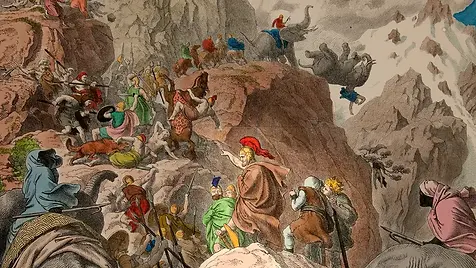top of page

Hannibal (247–183 BCE)

Born in 247 BCE into the powerful Barca family, Hannibal was raised in the shadow of his father, Hamilcar Barca, a leading Carthaginian general. From a young age, Hannibal was instilled with a fierce hatred of Rome, which had emerged as Carthage's primary rival following the First Punic War. Hannibal's father had fought to protect Carthaginian interests in Sicily, and it was in this context of bitter rivalry that Hannibal vowed to continue the struggle against Rome.

Hannibal's most famous campaign began in 218 BCE, during the Second Punic War. In an audacious move, he led a diverse army—including war elephants—on a perilous journey from Iberia (modern Spain) across the Alps and into Italy. This feat, considered one of the most remarkable military achievements in history, caught the Romans completely off guard. Hannibal's campaign in Italy was marked by a series of stunning victories, including the Battle of Cannae in 216 BCE, where he inflicted one of the worst defeats on the Roman Republic.
Despite his successes, Hannibal's campaign eventually faltered due to logistical challenges, lack of reinforcements, and Rome's strategic countermeasures. His inability to secure a decisive victory over Rome and the eventual shift of the war to Carthaginian territory led to his recall to defend Carthage. In 202 BCE, Hannibal faced the Roman general Scipio Africanus at the Battle of Zama in North Africa, near modern-day Tunisia. Hannibal was decisively defeated, marking the end of the Second Punic War and the beginning of Carthage's decline.
Hannibal's impact on history extends beyond his military campaigns. He is remembered as a master of strategy and tactics, whose innovative approaches to warfare have been studied for centuries. His legacy in Libya is particularly significant given the region's connection to Carthage, a civilization that played a pivotal role in the development of North Africa. Carthaginian influence stretched across Libya, with cities such as Leptis Magna and Sabratha reflecting the reach of Carthaginian culture and commerce.
After his defeat, Hannibal continued to resist Roman dominance through diplomacy and by serving as a military advisor to other states opposed to Rome, including in the eastern Mediterranean. However, his relentless opposition to Rome eventually led to his downfall. In 183 BCE, facing capture by Roman agents, Hannibal chose to take his own life, preferring death over submission to his lifelong enemies.
For Libya, Hannibal's story is a reminder of the deep historical roots that connect the region to the broader Mediterranean world. His life and legacy illustrate the complex interplay of power, culture, and conflict that shaped ancient North Africa and left an enduring mark on its history. Hannibal remains a symbol of resistance and ingenuity, a figure whose influence transcends his time and continues to resonate in the historical consciousness of Libya and beyond.
bottom of page
